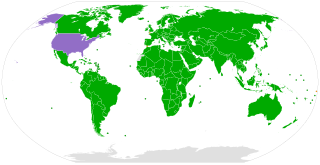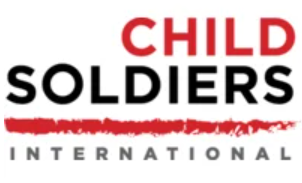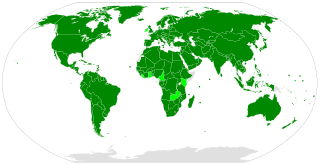| |||||
| Decades: | |||||
|---|---|---|---|---|---|
| See also: | Other events of 2002 Timeline of Cabo Verdean history | ||||
The following lists events that happened during 2002 in Cape Verde .
| |||||
| Decades: | |||||
|---|---|---|---|---|---|
| See also: | Other events of 2002 Timeline of Cabo Verdean history | ||||
The following lists events that happened during 2002 in Cape Verde .

The United Nations Convention on the Rights of the Child is an international human rights treaty which sets out the civil, political, economic, social, health and cultural rights of children. The convention defines a child as any human being under the age of eighteen, unless the age of majority is attained earlier under national legislation.

Child Soldiers International, formerly the Coalition to Stop the Use of Child Soldiers, was a UK-based non-governmental organization that worked to prevent the recruitment, use and exploitation of children by armed forces and groups. It ceased operations as of 7 June 2019.

The Optional Protocol to the Convention on the Rights of the Child on the Involvement of Children in Armed Conflict (OPAC), also known as the child soldier treaty, is a multilateral treaty whereby states agree to: 1) prohibit the conscription into the military of children under the age of 18; 2) ensure that military recruits are no younger than 16; and 3) prevent recruits aged 16 or 17 from taking a direct part in hostilities. The treaty also forbids non-state armed groups from recruiting anyone under the age of 18 for any purpose.

The Optional Protocol on the Sale of Children, Child Prostitution and Child Pornography is a protocol to the Convention on the Rights of the Child and requires parties to prohibit the sale of children, child prostitution and child pornography.

The Committee on the Rights of the Child (CRC) is a body of experts that monitor and report on the implementation of the United Nations Convention on the Rights of the Child.

Human rights are largely respected in Switzerland, one of Europe's oldest democracies. Switzerland is often at or near the top in international rankings of civil liberties and political rights observance. Switzerland places human rights at the core of the nation's value system, as represented in its Federal Constitution. As described in its FDFA's Foreign Policy Strategy 2016-2019, the promotion of peace, mutual respect, equality and non-discrimination are central to the country's foreign relations.

The U.S. Department of State's Country Report on Human Rights Practices for São Tomé and Príncipe states that the government generally respects the human rights of its citizens, despite problems in a few areas.

Human rights in Chad have been described as "poor"; for example, Freedom House has designated the country as "Not Free." Chad received a score of 7 for political rights and 6 for civil liberties.

Historically, Comoros has had a relatively poor human rights record.

The Republic of Congo gained independence from French Equatorial Africa in 1960. It was a one-party Marxist–Leninist state from 1969 to 1991. Multi-party elections have been held since 1992, although a democratically elected government was ousted in the 1997 civil war and President Denis Sassou Nguesso has ruled for 26 of the past 36 years. The political stability and development of hydrocarbon production made the Republic of the Congo the fourth largest oil producer in the Gulf of Guinea region, providing the country with relative prosperity despite instability in some areas and unequal distribution of oil revenue nationwide.
The Congolese Human Right Observatory claims a number of unresolved and pending issues in the country.
Discrimination against Pygmies is widespread, the result of cultural biases, especially traditional relationships with the Bantu, as well as more contemporary forms of exploitation.

Human rights in Madagascar are protected under the national constitution. However, the extent to which such rights are reflected in practice is subject to debate. The 2009 Human Rights Report by the United States Department of State noted concerns regarding the suspension of democratic electoral processes as the result of recent political unrest. Furthermore, reports of corruption, arbitrary arrest and child labor highlight the prevalence of human rights issues in the country.
Bife de tartaruga is a traditional Cape Verdean dish, particularly on the Ilha de Santiago.

Human rights in Cameroon are addressed in the constitution. However, the 2009 Human Rights Report by the United States Department of State noted concerns in regard to election irregularities, security forces torture and arbitrary arrests.

Human rights in Cape Verde are addressed under the national constitution.

Human rights in Burkina Faso are addressed in its constitution, which was ratified in 1991. The 2009 Human Rights Report by the United States Department of State noted concerns regarding restrictions on the press and the operation of the judiciary system. In its 2021 report, Human Rights Watch described the human rights situation in Burkina Faso as being "precarious" in light of ongoing violence committed by Islamists, government security forces, and pro-government militias.
Events in the year 2011 in Cape Verde.

Human rights are "rights and freedoms to which all humans are entitled". Proponents of the concept usually assert that everyone is endowed with certain entitlements merely by reason of being human.

Equatorial Guinea is known for human rights abuses. Under the current government it has "limited ability of citizens to change their government; increased reports of unlawful murders of civilians by security forces; government-sanctioned kidnappings; systematic torture of prisoners and detainees by security forces; life threatening conditions in prisons and detention facilities; impunity; arbitrary arrest and detention and incommunicado detention; harassment and deportation of foreign residents with limited due process; judicial corruption and lack of due process; restrictions on the right to privacy; restrictions on freedom of speech and of the press; restrictions on the rights of assembly, association, and movement; government corruption; violence and discrimination against women; suspected trafficking in persons; discrimination against ethnic minorities; and restrictions on labor rights."

The cuisine of Cape Verde is a West African cuisine largely influenced by Portuguese, Southern and Western European and West African cuisine. Cape Verde was a colony of Portugal from its colonization until 1975.
The following lists events that happened during 2000 in Cape Verde.